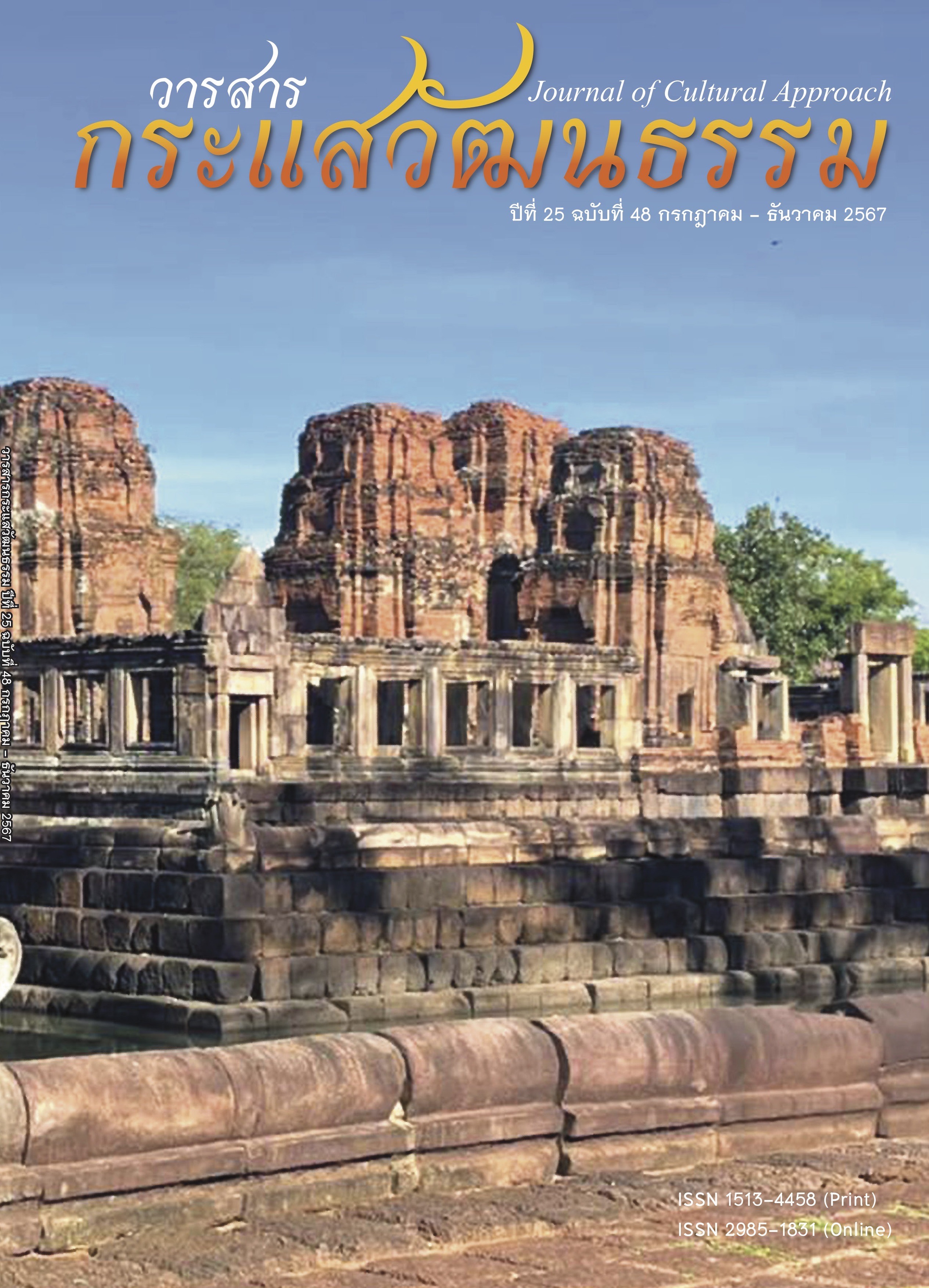การจัดการความเสี่ยงของธุรกิจนำเที่ยวด้วยจักรยานในกรุงเทพมหานคร
Main Article Content
บทคัดย่อ
การศึกษาวิจัยครั้งนี้ มีวัตถุประสงค์เพื่อวิเคราะห์และประเมินความเสี่ยงของธุรกิจนำเที่ยวด้วยจักรยานในรุงเทพมหานคร และเสนอแนะแนวทางการจัดการความเสี่ยงของธุรกิจนำเที่ยวด้วยจักรยานในกรุงเทพมหานคร งานวิจัยครั้งนี้เป็นงานวิจัยเชิงคุณภาพ ด้วยการเก็บรวบรวมข้อมูลจากเอกสาร การสำรวจพื้นที่ และการสัมภาษณ์เชิงลึก โดยมีกลุ่มตัวอย่างคือ นักท่องเที่ยวชาวไทยและชาวต่างชาติที่มีประสบการณ์ท่องเที่ยวด้วยจักรยานในกรุงเทพมหานคร อายุตั้งแต่ 18 ปีขึ้นไป ผู้ประกอบการธุรกิจท่องเที่ยวด้วยจักรยานในกรุงเทพมหานครที่มีประสบการณ์ที่เกี่ยวข้องกับการท่องเที่ยวเชิงจักรยานไม่น้อยกว่า 3 ปี ผู้มีส่วนได้เสียจากท่องเที่ยวด้วยจักรยานในกรุงเทพมหานคร จำนวนรวม 77 คน
ผลการวิจัยพบว่า ความเสี่ยงด้านความปลอดภัยและความเสี่ยงด้านภัยธรรมชาติมีระดับความเสี่ยงอยู่ในระดับสูง ความเสี่ยงด้านภาพลักษณ์การท่องเที่ยวและด้านสาธารณูปโภคมีระดับความเสี่ยงระดับปานกลาง นอกจากนี้แนวทางการจัดการต่อความเสี่ยงของธุรกิจนำเที่ยวด้วยจักรยานในกรุงเทพมหานคร แบ่งออกเป็น 4 วิธี ได้แก่ การหลีกเลี่ยงความเสี่ยง การลดความเสี่ยง การหาผู้ร่วมรับความเสี่ยง/การร่วมจัดการ และการยอมรับความเสี่ยง
Article Details

อนุญาตภายใต้เงื่อนไข Creative Commons Attribution-NonCommercial-NoDerivatives 4.0 International License.
Proposed Creative Commons Copyright Notices
1. Proposed Policy for Journals That Offer Open Access
Authors who publish with this journal agree to the following terms:
- Authors retain copyright and grant the journal right of first publication with the work simultaneously licensed under a Creative Commons Attribution License that allows others to share the work with an acknowledgement of the work's authorship and initial publication in this journal.
- Authors are able to enter into separate, additional contractual arrangements for the non-exclusive distribution of the journal's published version of the work (e.g., post it to an institutional repository or publish it in a book), with an acknowledgement of its initial publication in this journal.
- Authors are permitted and encouraged to post their work online (e.g., in institutional repositories or on their website) prior to and during the submission process, as it can lead to productive exchanges, as well as earlier and greater citation of published work (See The Effect of Open Access).
Proposed Policy for Journals That Offer Delayed Open Access
Authors who publish with this journal agree to the following terms:
- Authors retain copyright and grant the journal right of first publication, with the work [SPECIFY PERIOD OF TIME] after publication simultaneously licensed under a Creative Commons Attribution License that allows others to share the work with an acknowledgement of the work's authorship and initial publication in this journal.
- Authors are able to enter into separate, additional contractual arrangements for the non-exclusive distribution of the journal's published version of the work (e.g., post it to an institutional repository or publish it in a book), with an acknowledgement of its initial publication in this journal.
- Authors are permitted and encouraged to post their work online (e.g., in institutional repositories or on their website) prior to and during the submission process, as it can lead to productive exchanges, as well as earlier and greater citation of published work (See The Effect of Open Access).
เอกสารอ้างอิง
Agricultural Research Development Agency (ARDA). (2019). Risk Management Manual. Bangkok.
Allen-Munley, C., Daniel, J. & Dhar, S. (2004). Logistic Model for Rating Urban Bicycle Route Safety. Transportation Research Record, 1878(1), 107–115.
Chen, C. A. & Lee, H. L. (2017). How to Promote Bike Tourism Globally. Tourism and Hospitality Management, 23(1), 1–16.
Deenihan, G. & Caulfield, B. (2015). Do Tourists Value Different Levels of Cycling Infrastructure? Tourism Management, 46, 92–101.
Estevão, C. & Costa, C. (2020). Natural Disaster Management in Tourist Destinations: a Systematic Literature Review. European Journal of Tourism Research, 25, 2502–2502.
Feng, H., Donglai, L., Jie, Z. & Jian F., (2014) Related Risk Factors for Injury Severity of E-bike and Bicycle Crashes in Hefei. Traffic Injury Prevention, 15(3), 319–323.
Hsieh, L. Y., Lin, Y. C., Lee, Y. H. & Lee, S. T. (2021). Relationship between Bikeway Image, Tourism Value and Intention to Revisit Bikeways in Taiwan. Journal of Information and Optimization, 42(1), 235–248.
Kongsai, T. (2016). Survey of the Trend of Cyclists in Bangkok, Bangkok to Measure the Future of 'Bike Lanes'. https://www.komchadluek.net/scoop/229636
Meng, M., Koh, P. P., Wong, Y. D. & Zhong, Y. H. (2014). Influences of Urban Characteristics on Cycling: Experiences of Four Cities. Sustainable Cities and Society, 13, 78–88.
Ministry of Tourism and Sports (MOTS). (2023). Annual Government Operational Plan 2023. https://secretary.mots.go.th/ewtadmin/ewt/secretary/download/PDF/plan66smots.pdf
Prasopsap, B. (2023). Thai Bicycle Tour… Far from the World Rankings from CNN Travel. https://www.matichonweekly.com/column/article_665057
Reynolds, C. C., Harris, M. A., Teschke, K., Cripton, P. A. & Winters, M. (2009). The Impact of Transportation Infrastructure on Bicycling Injuries and Crashes: A Review of the Literature. Environmental Health, 8, 1–19.
Rindrasih, E. (2010). Tourism and Disaster: the Review of Government Policy toward the Impact of Natural Disaster on Tourism Industry Performance. Development, 470, 481.
Ritchie, B. W. (1998). Bicycle Tourism in The South Island of New Zealand: Planning and Management Issues. Tourism Management, 19(6), 567–582.
Ritchie, B. W. (2004). Chaos, Crises and Disasters: A Strategic Approach to Crisis Management in the Tourism Industry. Tourism Management, 25(6), 669–683.
Ritchie, B. W. & Hall, C. M. (1999). Bicycle Tourism and Regional Development: A New Zealand Case Study. Anatolia, 10(2), 89–112.
Schiffman, L. G. & Wisenblit, J. (2010). Consumer Behavior. Prentice–Hall.
Sitthiphan, C. (2022). Create a Bicycle District: Travel Around by Cycling (Bicycle Corridor). https://www.chadchart.com/policy/624ad29297c037fe0be0b6eb/
Sonthamino, P. (1997). Guideline of Bicycle Lane Management for Cultural Tourism in Nakhon Si Thammarat Metropolitan. King Mongkut's Institute of Technology Ladkrabang.
Tsai, C. H. & Chen, C. W. (2011). The Establishment of a Rapid Natural Disaster Risk Assessment Model for the Tourism Industry. Tourism Management, 32(1), 158–171.


